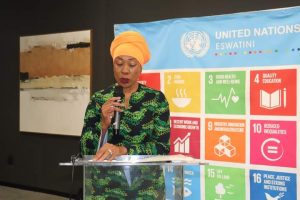By Delisa Thwala
The Ministry of ICT, in partnership with the Kingdom of Eswatini Academy of Sciences (KEAS) and the Next Einstein Forum, hosted the second Innovation Forum under the theme: ‘The Role of Women and Youth Leadership in Accelerating the Achievement of SDGs’
This is where the Ministry of ICT Under Secretary Mancanjana Motsa on behalf of the Minister Savannah made the statement of inclusivity being key to helping achieve SDG goals.
This event brought together innovators, researchers, business community, leaders, Government and entrepreneurs to showcase solutions led by women and youth to address daily challenges.
In empowering these groups, Eswatini is taking deliberate steps to advance the Sustainable Development Goals (SDGs) and create a future of endless opportunities.
RELATED: Minister Jane cautions, calls for harmony in conflicts between rangers and poachers
Meanwhile, the Ministry of Information, Communications, and Technology (ICT) called for inclusive innovation, particularly through women and youth leadership, to accelerate Eswatini’s progress toward achieving the Sustainable Development Goals (SDGs).
The Forum coincided with Africa SDGs Week, and focused on the theme ‘The Role of Women and Youth Leadership in Accelerating the Achievement of Sustainable Development Goals (SDGs) in Eswatini’
Speaking on behalf of the Minister of ICT, the Ministry’s Under Secretary, Macanjana Motsa, highlighted the critical role of women and youth in tackling pressing challenges such as poverty, inequality, and climate change.

“Innovation and entrepreneurship are on the rise, and it is our duty as African nations to support one another by sharing knowledge, and resources, and building strong partnerships,” she remarked.
While acknowledging Eswatini’s alignment with the SDGs – particularly in areas such as education, healthcare, and clean water – Motsa noted that only 17% of SDG targets have been met globally, stressing the need for increased collaboration and innovation to meet the 2030 targets.
The Ministry outlined several key initiatives aimed at promoting Science, Technology, and Innovation (STI) in line with the African Union’s Agenda 2063 and the SADC Industrialization Strategy 2015–2063.
Legislative frameworks, including the 2023 National Research Council Act, the RSTP Act of 2023, and the 2022 Data Protection and Cyber Security Acts, were highlighted as part of the country’s efforts to strengthen ICT infrastructure. These efforts align with SDG 9 on industry, innovation, and infrastructure.
“These frameworks seek to drive economic transformation through STI, adding value to our region’s resources.
We are also committed to increasing access to ICT infrastructure, particularly through broadband communication and the development of research facilities at the Royal Science and Technology Park (RSTP), positioning it as a hub for innovation and foreign investment,” she said.
Motsa also emphasised the Ministry’s push to boost women’s participation in STEM fields through the National Chapter on Women in STEM and the annual Scholarship for Women in ICT.
The Ministry is also set to launch the Eswatini Young Academy of Sciences to provide a platform for young scientists to contribute to both national and global innovation solutions.
Echoing the Ministry’s call, Lindiwe Gama from South Africa’s Department of Science and Innovation virtually joined the Forum and emphasised the importance of inclusivity in achieving the SDGs.
Gama underscored that sustainable development requires the involvement of all stakeholders, particularly in promoting gender equality and women’s empowerment.
Highlighting the critical role of women and youth as change agents, she stated that without women’s empowerment, Africa cannot progress.
Gama urged for inclusive policies that support women across all sectors, including access to education, healthcare, and economic opportunities.
She called for supportive measures like flexible working hours and parental leave to help women balance their professional and personal lives.
Gama shared examples from South Africa’s initiatives aimed at increasing women’s representation in research and innovation, stressing the need for resources, mentorship, and a supportive environment for women to thrive.
She concluded by reaffirming that no one should be left behind in the pursuit of progress and encouraged women to support one another to foster a more equitable society.
The event gathered stakeholders from universities, research institutions, policymakers, and industry leaders to support women and youth innovators.
Motsa encouraged the business community to mentor young innovators and create market opportunities for their innovations, emphasising partnerships as key to achieving SDG 17 (Partnerships for the Goals).
On Tuesday, the United Nations was at Esibayeni Lodge, Matsapha, for the National Capacity Building Workshop on localising the Sustainable Development Goals (SDGs) through Voluntary Local Reviews (VLRs)
Hosted by UN Eswatini in partnership with the Ministry of Economic Planning and Development, this workshop was designed to empower local governments in Eswatini to integrate SDGs into local plans and actions, ensuring no one is left behind as they work toward the 2030 Agenda.
The three-day workshop will feature sessions on data collection, planning tools, and success stories from other countries. It’s a major step forward for Eswatini’s sustainable future.